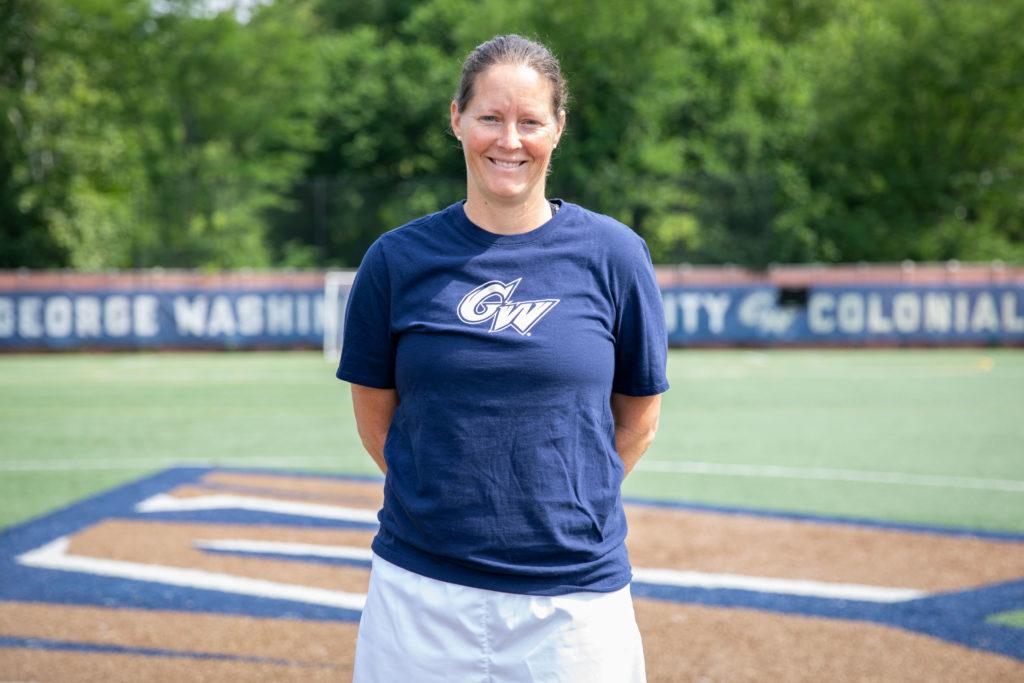This season, women’s soccer will be led by former professional soccer player Michelle Demko, who was named head of the program in April after former head coach Sarah Barnes resigned in February.
Demko brings an impressive resume to GW following an eight-year stint coaching at UNC Asheville. In addition to her 15 years of experience coaching at the collegiate level, Demko played professionally in the United States and Germany throughout the 1990s and early 2000s.
Demko inherits a team with 22 returners from last year’s roster with the addition of seven rookies. The coach only had one week to train the team that went 10-5-4 last season overall before summer vacation began.
Before preseason training officially gets underway in July, Demko sat down with The Hatchet to talk about her coaching style, expectations for the team’s upcoming season and building trust with her new squad.
You have vast experience as both a player and a coach. How do you think that experience will play into taking over a new program?
Michelle Demko: With any type of transition comes new energy, so I think right off the bat from a player’s perspective, things are going to be different. Sometimes when there are transitions, that motivates people, so hopefully players are coming to the table with an eagerness.
Preseason for us will be getting up to speed and having the players understand what our expectations are for our personnel and just figuring out how each player is best pushed and challenged in a way that doesn’t have them fear what this new transition is going to look like.
What are some tenets of your personal coaching style and things that you would specifically like to focus on as head coach?
MD: The style of play that we’re going to implement here is going to be a high-speed style of play. We definitely want to be a pressing team.
When we win it, we’ll have a high counter attack movement, which is going to require us to have a high fitness level, a high speed of play and a dynamic movement on and off the ball. The expectation for me is that it’s a 90-minute game, and in the 87th or 89th minute I expect our engines to still be running at full capacity.
With any new role there’s a learning curve. What kind of challenges are you expecting in this first season in terms of growing pains and what can you do to combat them?
MD: I think it’s a tricky time to be hired, only having seven days with the team. We as a staff have begun conversations about what preseason will look like because the players don’t know the expectations fully yet.
In terms of growing pains, everybody’s going to have to trust the process. We’re going to have to be big communicators and be open to communication from staff to player and player to staff. I think there’s going to be a lot of trusting that needs to happen and communication in terms of what to expect and just feeling our way through it a little bit.
How do you come in and make those connections right away to make the program your own in your first year?
MD: We’ll have to implement a lot of team activities off the field, so not just myself but the other staff and also the players can all get to know each other.
I think one of the good things is that when you have a new staff and there is a transition, everyone is on equal playing ground. It’s an opportunity for players to put in the work in the summer and to make a statement to our staff about how prepared and how ready to go they are.
The more we can do as a team that will allow trust to flow through everyone in the team, the more we’ll be willing to take high risks on the field.
In the past, the team has done well in the regular season and then has fallen short in A-10 playoffs. What is your plan to get the team past that initial level and achieve milestones that it has been falling short on recently?
MD: We’ll have to look and see what the freshmen are bringing to the table. We have a number of players that are playing this summer, so hopefully by putting themselves in game-like situations, that will enhance and refine their game as well.
GW played in a 4-4-2 for a while, and so perhaps tinkering with the formation would allow us to just have a different look in our pocket.
It’s a lot of situation-play where we can be comfortable with some pressure and comfortable whether we’re up a goal or down a goal, moments that we can recreate for the players, and the more we can do that, the more they’ll be accustomed to those opportunities.





